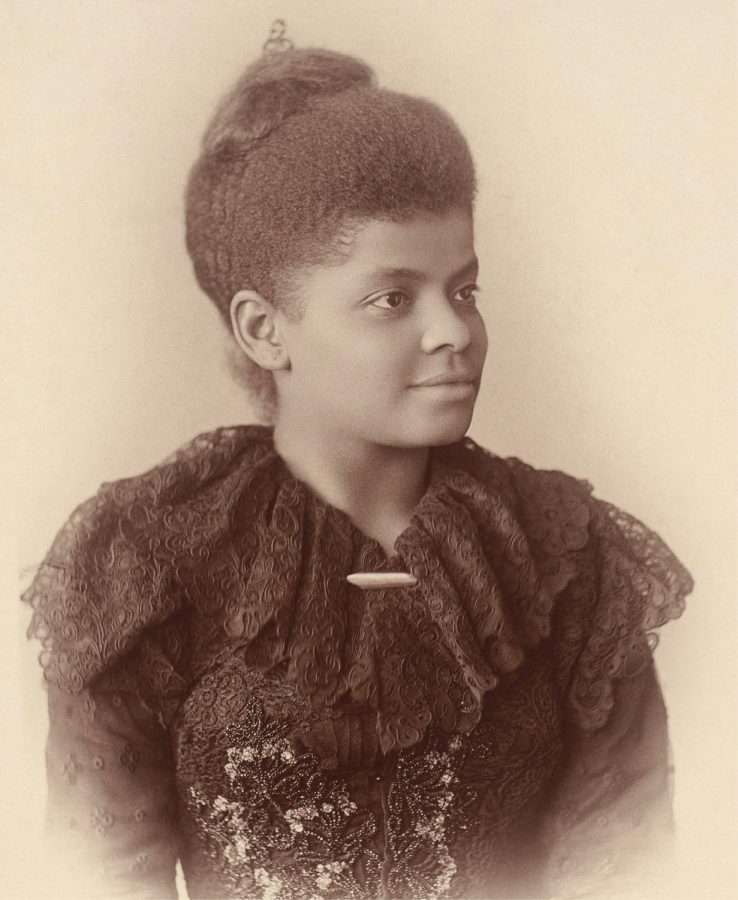Ida B. Wells Through her Great-Granddaughter’s Eyes
February 10, 2023
Ida B. Wells is an inspiration and is known for being a leader in the civil rights movement. A journalist, teacher, feminist, and activist, Wells defied gender roles, covering “hard-news” stories as well as being co-owner and editor of the [Memphis] Free Speech and Headlight. After her press in the South was burned down, and there was too much of a threat of violence and racism for her to return, she began writing for the New York Age. These were jobs that were seen as a “man’s job.”
On Monday, Feb. 6, Michelle Duster, great-granddaughter of Wells talked to The Headlight staff about her great-grandmother’s journalistic work. Duster highlighted not only the importance of her grandmother’s work but also the way in which she went about it. Wells wasn’t just a journalist. She was an investigator and a pioneer of data journalism.
She included facts and statistics, as well as quotes and excerpts, neither of which could be denied. “Which is genius,” Duster said. “Because nobody can argue with numbers. Nobody can argue with facts. They can try to say it’s alternative facts, but you can pull out reference and actually document this, or back it up.”
Wells spent her journalistic career investigating lynchings and uncovering the truth. She reported on who, what, when, where, and why lynchings occurred. She gave specific summaries including the names of both the victims and perpetrators and directly connected lynchings to Black oppression and progress.
Wells’ work is considered data journalism both because of the exact facts she used as well as her use of primary sources. Even when it was dangerous, Wells would go to the aftermath of lynchings and interview the people there. She heard their stories, accumulated background information, and documented the lack of punishment for perpetrators. Wells included what she found in a column that she wrote for the New York Age. These columns were eventually compiled into a pamphlet titled “Southern Horrors. Lynch laws in all its phases.”
Wells clearly felt the truth needed to be told and she did that, as well as encouraging others too. “The assertion has been substantiated throughout these pages that the press contains unreliable and doctored reports of lynchings, and one of the most necessary things for the race to do is to get these facts before the public,” Wells wrote in Southern Horrors. Lynch Laws in all its Phases. “The people must know before they can act and there is no educator to compare with the press.”
These are just some examples of how Wells was a pioneer of data journalism. Yet far too often, the credit goes to the white men depriving her of her recognition. She isn’t the only Black woman whose recognition has failed to have been given to them. “We are still dealing with the marginalization and erasion of Black women,” said Duster.
“She also highlighted how sometimes the lynching victims had challenged white authority, even the most successful people,” Duster said. “There are so many cases that she outlines throughout all of her pamphlets. That’s what her goal was—to humanize the lynching victims but also make that, many times, those victims challenged the sort of white hierarchical, white supremacy social structure of our country.”
In March of 2022, the anti-lynching bill became effective, making lynchings a federally illegal crime. 130 years after Wells began her work of spreading the truth about lynchings and after 200 hundred tries of trying, Wells never got to see the change she was working for.
Wells used her writing and role in the media outlet to be an activist. Journalism’s role is to educate the public, be the first chronicle of history, and contribute to democracy. All of this adds to its power and makes its role that much more valuable and important that the truth is being told.
Wells used her media outlet to share the truth and she gave voice to a narrative that wasn’t being heard elsewhere. Her writing was a form of activism that held tremendous power, making others want it to be hidden and controlled. When the media is controlled, contorted, and hidden, it makes it hard to find the truth. Duster encouraged looking at multiple sources, looking for the facts, and coming to your own conclusions.
Wells wanted the perpetrators of racist violence toward Black people to be held accountable. She did everything possible to make that happen, including writing under the pen name “Lola” to keep herself safe. Wells’ legacy lives on through her descendants as well as the journalists today that are also doing everything possible to inform the public the truth that some don’t want to be told.



